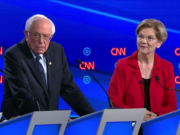Once upon a time, if someone wanted to know how much you contributed to a federal or state candidate campaign, they had to undertake a complicated series of labor-intensive steps. These would include (a) finding out where the relevant records were stored (maybe by spending quality time with phone books and making numerous phone calls); travelling to that location; and then (c) trawling through those records. They would be wading through mounds of paper (or using a microfiche reader!). It is unlikely that their research would be aided by any kind of index.
Today, the same research might take five minutes. Just five minutes for someone to do an online search to find out your personal history of contributing to state and local political campaigns, even if you made those contributions decades ago. Who did you give money to? How much did your contributions add up to? When did you make them? Where do you live? Where did you work? Everything a potential employer or miscreant would need to avoid hiring or punishing you for your political positions.
The nation’s laws have fallen well behind the technological advances of the Internet Age, and, as a result, the privacy of every American has been laid open to potential abuse. As political violence intensifies, now is the time for change. And this can be accomplished with very little legislative effort, because the Federal Election Commission has already recommended language for federal disclosure laws that could easily be adapted and applied by Congress and the states.
The Statutory Status Quo
Almost every state has statutes on its books that require the public disclosure of your name and address if you donate to a candidate, political party, or political action committee (PAC). This mandate kicks in when a donor’s contributions reach a particular monetary threshold (usually either per reporting period, calendar year, or election cycle) for giving to the recipient. The thresholds are often shockingly low, with the national median at $100 and eight states requiring disclosure for people who give any amount, even a penny.
Take Colorado, for example. The relevant portion of the Colorado Secretary of State’s “Rules Concerning Campaign and Political Finance” reads as follows:
Committees must individually list all contributions of $20 or more received during a reporting period, including names and addresses of the contributors. If a contributor gives $20 or more in the aggregate during the reporting period, the committee must individually list the contributor on the report, regardless of the amount of each contribution.[i]
That could include someone whose $20 contribution was made up of two $3 donations, one $4 donation, and one $10 donation—all made at various times within the reporting period. As a result, that person would have their name and full street address made public for anyone to see online.
Many of the privacy problems inherent in these disclosure requirements can be reduced simply by ensuring that requirements are only applied to major donors. For statewide races, we suggest a threshold of $2,500. It is hard to imagine any government interest in disclosure that publicly reports small contributions.
Raising donor disclosure thresholds also greatly simplifies reporting requirements. Requiring campaigns, many of which are run by volunteers, to report each $5, $10, $25, or $50 donation is very burdensome.
Three states, including the two most populous, currently provide their resident contributors with greater privacy than the others. In California and Texas, a contributor’s name and address are still reported to the campaign finance regulator, but the person’s street address is not publicly reported. Wyoming’s regulator does not require street address reporting to the state.
Unless you live in one of those three states, when you make contributions over a relatively low threshold to electoral campaigns your full street address will almost always be disclosed to the state and then remain available online for anyone to see.
By contrast, in California, Texas, or Wyoming, the privacy of contributors to campaigns is valued more than if they live in any of the other 47 states.
- California: – under state law, the addresses of contributors to campaigns cannot be publicly disclosed by the state online.[ii]
- Texas: No street addresses may be disclosed; only a contributor’s city of residence, and zip code, may be disclosed online.[iii]
- Wyoming: No street addresses are disclosed, only a contributor’s city of residence, state, and zip code.[iv]
Indeed, in Wyoming – unlike in California and Texas – campaigns are not even required to submit street address information when reporting contributions.
Details Matter
This is good news for residents of these states. However, it is important to note that two of the states ultimately provide individuals with less privacy protections than the above summary suggests.
California
Under California law, “the Secretary of State…shall…[m]ake all the data filed available on the internet …. [but t]he data made available on the internet shall not contain the street name and building number of the persons or entity representatives listed on the electronically filed forms….”[v]
However, the unredacted address lists for campaign finance and lobbying activity may be requested[vi] by printing out a Data Processing Service Request form and then mailing it with the requisite payment to the Political Reform Division of the Office of the California Secretary of State. So, if someone wants to pay to obtain the disclosure data— and then put those data, complete with full names and address of contributors to campaigns, on the Internet for all to see, they can.
Additionally, the statutory language quoted above comes from CA S.B, 2108, now part of the California code that Governor Gray Davis signed into law in September 2000. Technology— and therefore, technological access to data— has changed exponentially in the past quarter century.
Texas
Similarly, the Texas Election Code stipulates that: “Before making a report filed… available on the Internet, the commission shall remove each portion, other than city, state, and zip code, of the address of a person listed as having made a political contribution to the person filing the report. The address information removed must remain available on the report maintained in the commission’s office but may not be available electronically at that office.”[vii]
However, the law also indicates that “information from reports” “shall” be “made available by electronic means, including: (1) providing access to computer terminals at the commission’s office; (2) providing information on computer diskette for purchase at a reasonable cost; and (3) providing modem or other electronic access to the information.”[viii]
An Opinion of the Texas Attorney General (TXOAG) provides interpretive clarity of the meaning of these seemingly inconsistent statutory provisions: “at any time after a [campaign contributions disclosure] report is filed, the Commission must disclose electronic copies of the report by, for example, computer diskette or CD as required by the Public Information Act.”[ix]
So just as in California, if someone wants to obtain the full street addresses of contributors to campaigns, and put those data online, they can. While this process will take more than a few minutes, a sufficiently motivated individual can easily achieve this goal, potentially forever compromising the privacy of thousands.
And again, just as in California, neither the Texas law nor the TXOAG are recent. The statutory languages date back to 1999 when then-Governor George W. Bush signed H.B. 2611 into law in June 1999, and the TXOAG was issued in November 2001. In both cases, the rules originated a generation ago—a tremendously significant span of time, given the advances in online searching during the interim.
To wit, private data made unavailable online is clearly insufficient when such exploitable workarounds exist in plain view.
A Twenty-First Century Solution
But the news is not all bad. There is a way to provide every American with a greater measure of donor privacy. In May 2024, Dara Lindenbaum, a Commissioner of the Federal Election Commission, urged Congress to enact a law protecting this information on federal campaign finance reports. She pointed to California and Texas as examples of states with well-designed disclosure regimes that protect the privacy and safety of contributors to state and local political campaigns.[x] Specifically, she highlighted what she called the “two-tiered approach” of the country’s two most populous states. “Similar” to the changes that she was seeking to implement at the federal level, “both states…separately require that street names and street numbers not appear on reports that are made available online.”[xi]
However, as we have seen, even these “two-tiered approaches” are not perfect. But again, if we look to the work of the FEC, there is a suitable solution available. The Federal Election Commission has recommended that the Federal Election Campaign Act of 1971 be amended to include the following language:
The Commission shall not include the street name and street number of individual contributors in the information it makes available for inspection by the public in the offices of the Commission and accessible to the public on the Internet.[xii]
If this were adopted, as model language, by Congress and all fifty states, the privacy of every American would be greatly enhanced.
Conclusion
Your decision about how much to contribute to a political campaign should not be affected by privacy concerns. For example, you shouldn’t have to ask yourself, “will my safety be clearly compromised if I contribute $100 instead of $50?” Being forced to consider such concerns means that your freedom to engage in political speech is diminished.
Every year Americans spend billions of dollars on identity theft protection services, a global industry that experiences considerable annual growth.[xiii] But those services can do little to protect you when state governments enact laws compelling the collection and public electronic disclosure of your personal data if you support a candidate, party, or political committee.
Adopting the language of the FEC’s recommendation would help alleviate concerns about personal privacy and encourage more Americans to financially support the candidates of their choice.
We need to reduce the impediments that discourage Americans from participating in the political process, which is vital for the health of our republic. This simple common-sense reform, along with more reasonable contributor thresholds, are steps that Congress, and the states, should take at the earliest opportunity.
[i] Colorado Administrative Code, 8 CCR 1505-6-10, 10.2.1.
[ii] California Code, Government Code, § 84602(a)(4).
[iii] Texas Election Code, § 254.0401(e).
[iv] Wyoming Secretary of State, “2024 Campaign Guide,” 7, available at https://perma.cc/P428-F7SU; Wyoming Statutes § 22-25-106(a)(iv).
[v] California Code, Government Code, § 84602(a)(4).
[vi] Email from the Political Reform Division of the Office of the California Secretary of State to Helen Knowles-Gardner, May 23, 2025.
[vii] Texas Election Code, § 254.0401(e).
[viii] Texas Election Code, § 254.0402.
[ix] Opinion of the Attorney General of Texas, No. JC-0435, November 21, 2001, available at https://perma.cc/R3E4-P3XX
[x] Federal Election Commission, “Statement of Commissioner Dara Lindenbaum Urging Congress to Amend the Federal Election Campaign Act to Eliminate the Public Disclosure of Contributors’ Street Names and Street Numbers,” May 16, 2024, available at https://perma.cc/LC3S-RKH4.
[xi] Id., at 3 (italics added).
[xii] Federal Election Commission Legislative Recommendations 2024, approved December 12, 2024, 13, available at https://perma.cc/7AZC-9HLN.
[xiii] Fortune Business Insights, “Identity Theft Protection Services Market Size, Share & Industry Analysis, By Type (Credit Card Fraud, Bank Fraud, Phone or Utility Fraud, and Employment or Tax-related Fraud), By Application (Consumer and Enterprise), and By Regional Forecast, 2024-2032 – Summary,” available at https://perma.cc/SY9H-U947














